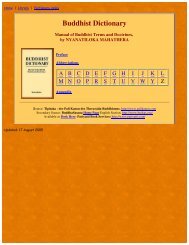The Truth of Anatta - Buddhist Publication Society
The Truth of Anatta - Buddhist Publication Society
The Truth of Anatta - Buddhist Publication Society
You also want an ePaper? Increase the reach of your titles
YUMPU automatically turns print PDFs into web optimized ePapers that Google loves.
self or soul is mentioned. All <strong>Buddhist</strong> schools, without exception, have rejected the atta-vāda or<br />
the doctrine which teaches the idea <strong>of</strong> a surviving personality <strong>of</strong> some sort, a psychophysical<br />
entity. What, in the view <strong>of</strong> the Buddha’s disciples, he did consider permanent is stated in the<br />
Sarvāstivāda version <strong>of</strong> the <strong>Anatta</strong>lakkhaṇa Sutta, which begins: ’Form has the nature <strong>of</strong> the<br />
destructible and with its cessation is Nirvana which is <strong>of</strong> indestructible nature,’ and so on with<br />
each <strong>of</strong> the five khandhas (Avadāna Sataka, 248).<br />
<strong>The</strong>re is a discourse in the Saṃyutta Nikāya (S III 25) called the ’Burden-Sutta’ (Bhārahāra<br />
Sutta) which speaks <strong>of</strong> the burden, the taking <strong>of</strong> the burden, the grasping <strong>of</strong> the burden and the<br />
laying down <strong>of</strong> the burden. <strong>The</strong> five khandhas are the burden. <strong>The</strong> grasping <strong>of</strong> the burden is the<br />
craving which tends to rebirth. <strong>The</strong> laying down <strong>of</strong> the burden is the complete cessation <strong>of</strong> this<br />
craving in all its forms. Here the word bhara-hara is used in reference to the individual, the<br />
person (puggala) <strong>of</strong> such and such a clan. It has sometimes (e.g., by Keith, <strong>Buddhist</strong> Philosophy;<br />
p. 82) been translated as ’burden–bearer,’ thus supporting the view that the sutta accepts a<br />
person, i.e. an attā or self apart from the five khandhas. But the word could equally well and<br />
with greater consistency be translated ’burden-taking.’ In any case, it is not important because it<br />
would be unjustified to try to prove from a single text that the individual is to be regarded as a<br />
permanent entity.<br />
It should be added that two <strong>Buddhist</strong> schools, the Sammitīyas and the Vajjiputtakas, held the<br />
conception <strong>of</strong> a person (puggala) which for all practical purposes may be regarded as an effective<br />
self. <strong>The</strong>y taught that the internal khandhas at a given moment constitute a certain unity which<br />
is related to them as fire is to fuel. This which is called puggala assumes new elements at birth<br />
and casts them <strong>of</strong>f at death. Since it was obviously another name for a self, this view was<br />
rejected by orthodox <strong>Buddhist</strong>s and the arguments adduced are given in the Kathāvatthu (i,1). It<br />
is significant that the ’heretics’ never thought <strong>of</strong> calling this self ātman but used instead a new<br />
term puggala. <strong>The</strong> Abhidharmakoṣa devotes a whole chapter to its refutation.<br />
It has been asked (e.g., by Mrs. Rhys Davids, <strong>Buddhist</strong> Psychology, 2 nd ed., p. 235) why if<br />
anattā was such a fundamental tenet in Buddhism, when the Paribbājaka Vacchagotta asked the<br />
Buddha: ’Is there an attā or is there not, the Buddha remained silent instead <strong>of</strong> saying<br />
categorically that there was no attā. <strong>The</strong> reason was given by the Buddha himself later to<br />
Ānanda, that if he had answered ’self exists,’ he would have been quoted by those who held the<br />
view <strong>of</strong> a permanent soul (sassatavādins). Whereas if he had said ’self does not exist,’ he would<br />
be siding with the annihilationists (ucchedavādins). Both were views with which he did not agree<br />
(S IV 400f). Besides, Vacchagotta was not yet ripe to understand the truth regarding attā. That<br />
ripeness came later and Vacchagotta became an arahant.<br />
Buddhism has no objection to the use <strong>of</strong> the words attā, or satta or puggala to indicate, the<br />
individual as a whole, or to distinguish one person from another, where such distinction is<br />
necessary, especially as regards such things as memory and kamma which are private and<br />
personal and where it is necessary to recognise the existence <strong>of</strong> separate lines <strong>of</strong> continuity<br />
(santāna). But, even so, these terms should be treated only as labels, binding-conceptions and<br />
conventions in language, assisting economy in thought and word and nothing more. Even the<br />
Buddha uses them sometimes. ’<strong>The</strong>se are worldly usages, worldly terms <strong>of</strong> communication,<br />
worldly descriptions, by which a Tathāgata communicates without misapprehending them” (D<br />
I 195f).<br />
<strong>The</strong> doctrine <strong>of</strong> anattā, like all other doctrines enunciated by the Buddha, has moral<br />
perfection as its purpose. <strong>The</strong> analysis <strong>of</strong> the five khandhas is in order to find out the condition<br />
and causes <strong>of</strong> their existence and their functioning, which are involved in impermanence and<br />
suffering, so that the Path to their cessation may be discovered and followed. To do this<br />
effectively, according to the Buddha, all false views and misconceptions should be eliminated.<br />
12

















